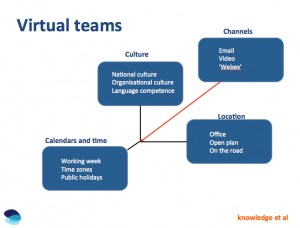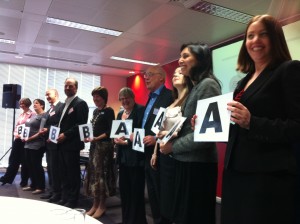It was like throwing a dart into a vacuum
Is how I responded on Twitter to Mark Gould an offsite observer of #KMLegal2015 who bemoaned the lack of online activity by the 100 or so Knowledge & Information Management (KIM) professionals who were attending this year’s Ark Group gathering of the UK KM legal community.
Its baffling: vendors, consultants and indeed KIM practitioners promote the value of social collaboration tools such as Yammer and Jive. Indeed KIM professionals are often at the forefront of efforts to get adoption in their organisation in order to improve collaboration and knowledge sharing. Yet they seem reluctant to ‘walk the talk’ in a public forum.
Perhaps Joanna Goodman got it right when she said:
sessions were quite interactive, so hard to be fully engaged and tweeting
It made me think more about why I tweet at a conference, this is what I posted during a virtual conversation with Luis Suarez a prodigious tweeter (58k to nearly 12k followers):
Why tweet a conference? Expand reach, collaborate, collect and share thoughts ‘on the fly’. Make notes for future blogs.
What really struck me though was the contrast with the Janders Dean Legal Knowledge & Innovation Conference, London #JDKMConf held the week before. That audience made sufficient ‘noise’ that even those who didn’t attend were able to draw conclusions. Here’s what Stephen Sander (The Vue Post) wrote in a witty piece about being a non attendee:
I curated below what I consider to be the best tweets from the Conference. These tweets offer an interesting insight into current themes and issues in legal knowledge, innovation and technology.
Perhaps this is the difference? The Janders Dean event was invitation only – a thought leaders event – whereas KM Legal is an open conference, if you pay up you can go!
Whatever the merits of both, facilitation should be at the core of the KIM professionals competency set and ‘putting stuff out there’ ia good part of that. Too many broadcast rather than engage. Knowledge Management in a comfort zone is not going to change the way a firm works and responds to the significant challenges facing the legal profession which brings me onto why I was there:
Managing Virtual Teams
In December, Martin White and I ran a breakfast breakout event at the RSA entitled The Future for Legal KIM: an outside in perspective’. One of the challenges firms identified as significant but for which they were ill prepared was the management of virtual teams. As a couple of long in the tooth practitioners who have worked across many continents we’d seen a wide range of organisations fail to match their virtual team technology investment with training in how to go about facilitating virtual encounters.
 Our brief for KM Legal 2015 was therefore entertain the audience, bring the issues to life. Our approach: tell stories and show images.
Our brief for KM Legal 2015 was therefore entertain the audience, bring the issues to life. Our approach: tell stories and show images.
We divided the presentation into these areas each drawing on events from our knowledge base.
In tackling the culture piece I noted the following:
Let me say right up front: you can’t manage culture just the same as you can’t manage knowledge. In both cases you can create environments in which people are willing to collaborate, share and work towards a shared set of goals.
Many organisations have a set of values and a social contract that underpins the relationship between the firm and employees.
Ultimately a firm is a collection of individuals each with their own reasons for being there. In a virtual team people’s fears, prejudices and behaviours are magnified.
In thinking and rehearsing for the session Martin and I had worked virtually. We learned a lot about clarity of messages and intent behind words and phrase (and we are both English). We (re) discovered the need for a collaboration space with a framework that suited us both.
We discovered a lot more besides, here’s what we shared with the delegates:
Ten virtual team success factors
- Virtual teams are the way work gets done: Recognise that virtual teams are going to be increasingly important to any organisation, and ensure that current and potential participants have access to training and mentoring on virtual team management and virtual team meetings.
- Set very clear and achievable objectives: Virtual teams should have very clear objectives so that it is possible to set the investment in the team against the outcome and also that team members bring appropriate skills, expertise and authority to take action.
- Chose virtual team leaders carefully: Leadership skills that work for physical teams may not be as valuable in a virtual team environment. Other skills are needed and have to be acquired through practice, not just through reading or teaching.
- Develop protocols for virtual meetings; Without good team meetings a virtual team is very unlikely to achieve its objectives and so particular care should be taken in developing guidelines for virtual meetings and for facilitating feedback.
- Provide team member profiles: Develop good profiles of each team member, taking into account local availability of technology and offices which can be used to take part in virtual meetings (especially in the case of open-plan offices) and language expertise.
- Build virtual relationships before putting them to the test: Each team should have an opportunity to meet with other members of the team through an initial virtual meeting where members can introduce themselves and gain experience with the technology being used before the first formal meeting of the team.
- Team dynamics can be difficult to manage: Team dynamics of virtual teams can be quite fragile, often depending on a very high level of trust in people they may not have met before. Introducing a new team member into an existing team may mean starting the process of building trust all over again.
- Gain consensus on what needs to happen between meetings?: Team members may have different reporting lines, which may impede the overall achievement of objectives. The measure of a virtual team is what it accomplishes between meetings, not how enjoyable the meetings are
- “English is our corporate language”: Issues of language and culture need careful consideration but should never be an excuse not to bring specific individuals into a team. There may be a mix of abilities in reading, speaking, understanding and writing in English
- Evaluate team and individual performance: The performance of the team and of each member should be carefully evaluated and training and support given where needed.

